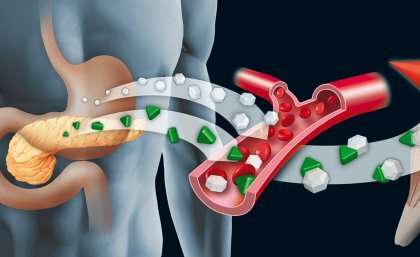Researchers discover why people with Laron dwarfism don't get diabetes

University of Queensland researchers have discovered a hidden metabolic advantage that prevents people with a specific type of dwarfism from developing type 2 diabetes or cancer.
UQ Diamantina Institute researcher Dr. Yash Chhabra said the findings could pave the way for new diabetes treatments for all.
"We set out to understand why, unlike most people, people with Laron dwarfism don't develop diabetes despite being obese," Dr. Chhabra said.
"People with Laron dwarfism aren't sensitive to growth hormone due to a defective growth hormone receptor in their cells.
"Growth hormone is responsible for regulating height, metabolism and obesity.
"Having defective receptors also means Laron dwarfs remain highly sensitive to insulin."
Emeritus Professor Michael Waters said normally when a person became obese, their sensitivity to insulin decreased and they eventually developed type 2 diabetes.
"Our study clarifies an issue that has been unresolved for 50 years," Professor Waters said.
"We discovered that a signalling molecule activated by the growth hormone receptors, called STAT5, was responsible for regulating this insulin sensitivity.
"Defective growth hormone receptors meant the STAT5 molecules weren't activated properly.
"This switching off of the STAT5 activation improved prevented insulin resistance by improving insulin signalling.
"This increased insulin receptors and reduced glucose output from the liver."
Dr. Chhabra said understanding how defective growth hormone receptors prevented diabetes at the cellular and tissue level could enable researchers to develop treatments for the general population.
"Both growth hormone receptors and STAT5 could become targets for new treatments," he said.
The study was a collaboration between UQ, the University of Melbourne and Boston University and is published in The FASEB Journal.
More information: Yash Chhabra et al. Loss of growth hormone–mediated signal transducer and activator of transcription 5 (STAT5) signaling in mice results in insulin sensitivity with obesity, The FASEB Journal (2019). DOI: 10.1096/fj.201802328R



















